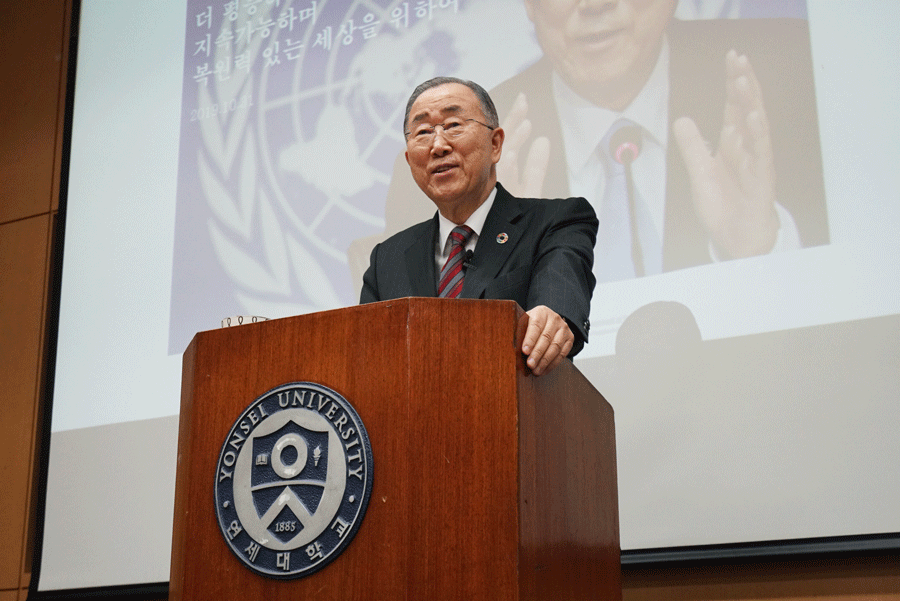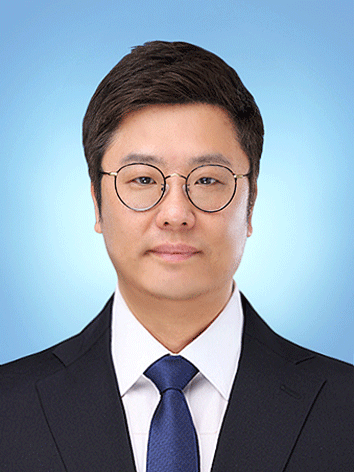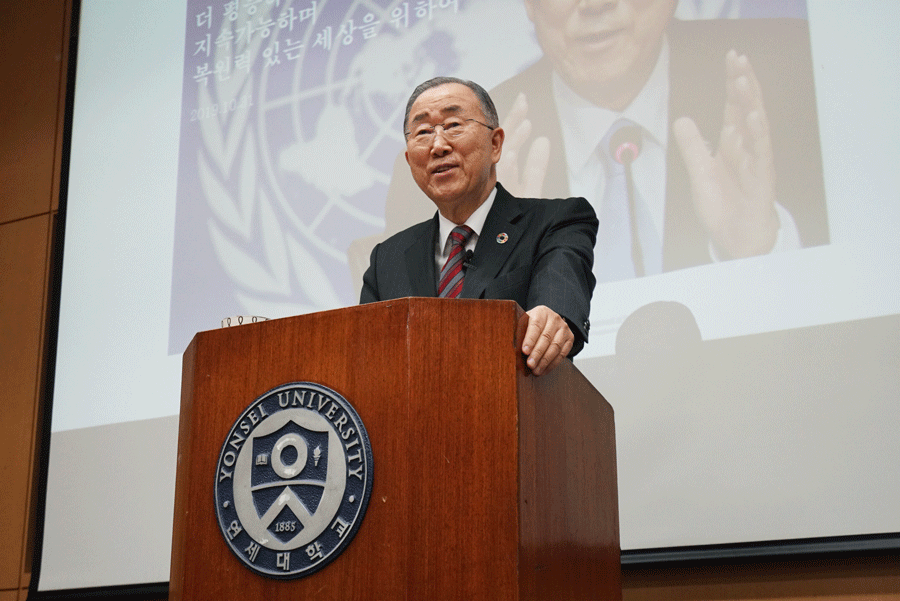- Striving for the Sustainable Future in the Pandemic with Ban Ki-Moon November 18, 2020
-
Introducing the “Understanding Sustainable Development with Ban Ki-moon” course at Yonsei

Amid the unprecedented pandemic situation, providing and sustaining quality education that students are now acquiring online has become more important than ever. With the world on hold and wary of the further spread of the pandemic, teachers and professors are exploring ways to deliver learning content more effectively to their students.
One notable example at Yonsei University in Seoul, Korea, is the Understanding Sustainable Development with Ban Ki-moon course. Before the year 2020, the classroom would usually be filled with a large audience of students expecting lively exchanges with visiting professors and, in particular, Ban Ki-moon, 8th Secretary-General of the United Nations (2007-2016) and Honorary Chair of the Institute for Global Engagement & Empowerment (IGEE) at Yonsei University.
However, in response to the pandemic disrupting the world this year, lecturer Dr. Young-ho Eom and Honorary Chair Ban are attempting new ways to make the already well-known lecture more engaging for their students. Dr. Eom shared his experiences of leading the course with Honorary Chair Ban and what it means to be teaching about the sustainable future in the post-COVID-19 era.
Teaching Sustainable Development at Yonsei University
Q. Please briefly introduce yourself.
 A. My name is Young-ho Eom. This semester, many would acknowledge me as the professor conducting the Understanding Sustainable Development with Ban Ki-moon course with Honorary Chair Ban Ki-moon. I received my Ph.D. in the Department of Public Administration at Yonsei University, and I am currently affiliated with the University College here at Yonsei. My research areas include international development cooperation, sustainable development, and social values. I also teach a class on Theories of Environmental Policy this semester.
A. My name is Young-ho Eom. This semester, many would acknowledge me as the professor conducting the Understanding Sustainable Development with Ban Ki-moon course with Honorary Chair Ban Ki-moon. I received my Ph.D. in the Department of Public Administration at Yonsei University, and I am currently affiliated with the University College here at Yonsei. My research areas include international development cooperation, sustainable development, and social values. I also teach a class on Theories of Environmental Policy this semester. Q. Tell us more about the Understanding Sustainable Development with Ban Ki-moon course.
This class offers students a friendly introduction to main concepts and ideas of Sustainable Development based on Honorary Chair Ban Ki-moon's experiences as the 8th Secretary-General of the United Nations for nine years. For this lecture, the concept of Sustainable Development Goals (SDGs) is structured into 5Ps (People, Plant, Properties, Peace, and Partnership) for students to have a broad understanding of the concept and the sub-concepts linked to respective SDG objectives to allow in-depth learning.
I am in charge of conducting supplementary lectures based on Honorary Chair Ban's Coursera classes. Honorary Chair Ban shares with us his expertise on sustainable development in a series of talks on Coursera. Then, I provide further explanations using domestic and international case studies and upload relevant PowerPoint slides on the main content of the lectures.
Q. With the COVID-19 pandemic resulting in the transition of all classroom-based instruction to virtual/online classes, what were some of the considerations you had when preparing for this lecture?
The transition to online classes certainly presented challenges for both professors and students. Under such circumstances, I have tried to reduce the academic pressure and create a learning-friendly environment where students can really gain interest and awareness in sustainable development and actively participate in discussions. For instance, as a replacement to the traditional attendance system, students submit a short paper on their opinions on various discussion topics handled in lectures and class materials.
Q. It must have been a memorable experience to conduct lectures with Honorary Chair Ban Ki-moon. Can you tell us some of the teachings he delivered to the students?
To think and discuss with Honorary Chair Ban has been a memorable experience for me and an excellent opportunity to broaden my academic perspective. I also think it’s very meaningful for students to learn from his personal experiences and perspectives that cannot be taught from textbooks. Honorary Chair Ban shares with students how to discuss sustainable development, its key concepts, and the main content in discussions. The class is exceptional in this sense, as his experiences in making important decisions in the field are reflected throughout the course.
Sustainable Development in Real Life
Q. As a professor in public administration, is there a reason for you to conduct a class related to sustainable development?
I believe that sustainable development is relevant to every major. Especially so for Public Administration, as it’s a practical and interdisciplinary major that can effectively associate sustainable development with areas such as national policies. In fact, during the lectures, I would frequently introduce K-SDGs and other Korean policies when dealing with the concept of sustainable development. With my previous interests offering a valuable opportunity to conduct related classes, it is certainly a joy to share my passion with Yonsei students.
Additionally, I'm sure many students already know me from my previous role as a program director and researcher at the Institute for Higher Education Innovation (IHEI) for the past two and a half years. During this period, I contemplated topics like social issues and sustainable development, particularly their applicability in society. This was also another significant motive for me to be involved in teaching about sustainable development.
Q. At this point, we are interested to know your idea of sustainable development.
While there are other important factors such as international cooperation and national policies, I think that the essence of sustainable development lies in the value of civic participation. Fundamentally speaking, people need to show actions and awareness of sustainable development in their daily lives, instead of it merely remaining as a theoretical concept.
Having considerations for the environment, showing care about those around you… These are the little things that would accumulate to transform our society, which I believe is the best description of Sustainable Development.
Q. How would you evaluate our current achievements regarding Sustainable Development Goals? And how do you think we should progress from now?
Sustainable development is not a goal that could be achieved through a single event of cooperation. This year, it is unfortunate to say that almost all of the major goals mentioned in the Convention on Biological Diversity have failed. As we can see from these agreements, international cooperation in a practical sense is very difficult to achieve.
However, there is still a reason to remain optimistic. The perception of the international community and its citizens is gradually yet effectively changing, so we have a positive outlook. This is not an exception for Korea, where we observe a gradual transition. The idea of sustainable development should be understood alongside a foundational understanding of the issue of poverty. Still, in Korea, there used to be a lack of interest in domestic poverty. However, in recent years, it seems to be moving forward little by little, with a recent increase in interest in domestic poverty along with the provision of general welfare. Furthermore, we are witnessing an increasingly noticeable rise in support in international poverty, which is a highly positive transition.
To achieve this goal of sustainable development, we must form a people-centric view of values. If we consider the environment, social, and economic development from this point of view, we can continue to progress as a whole while creating many social values.
For Yonseians Aspiring to Work in this Field
Q. You have written in the lecture syllabus that the class aims to foster global citizenship. What is your take on global citizenship, and what steps should Yonseians take to become future global citizens?
Becoming a global citizen is not difficult at all! Looking at those around you and taking an interest in social issues is the first step towards global citizenship. Contrary to what we often believe, not all social problems are in severe conflict or controversy. Ranging from issues in our own campus to the international community, it all starts from awareness and interest. So, talking to your colleagues and reflecting on your community can trigger a major change.
In that sense, I would like to recommend the Workstation program that IHEI has been running for the past three years. I sincerely hope that more students at Yonsei would participate in projects like this. You don’t need a life-changing idea; many projects that started from small campus issues have been running strong.
Along with this line, I also replaced midterm and final examinations in lieu of proposals for solving social issues and initiating projects. I am confident that experiences like these would make significant changes in students’ lifetime.
Q. What accomplishments do you think students at Yonsei can achieve if they participate in international development cooperation?
As the term “International Development Cooperation” suggests, the most important aspect is ‘cooperation.’ For cooperation to be impactful, it should be followed by a thorough understanding of social issues from a human-centered view, and I believe students at Yonsei are already acquiring this view through academic and extracurricular activities. Student participation is the first step, and accomplishments will follow.
Q. Any final comments for students currently taking your class online?
It is a difficult time for everyone, but I am sure that it will also serve as a time of new opportunities. Taking an interest in your surroundings can make a big difference, and knowing that everything in the world is interconnected, we need to start with small action for bigger changes. I fully understand the current virtual learning situation may make you passive. But, I hope that you will actively participate in the lecture and start working on projects of your interest!
show mobile menu
mobile menu




